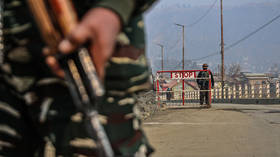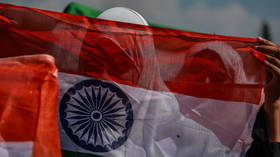India slams Pakistan over ‘terrorism factory’

Indian Defense Minister Rajnath Singh has accused Pakistan of seeking funding from global financial institutions to sustain a “terrorism factory” amid a severe economic crisis.
Speaking at a political rally in Jammu and Kashmir, a region claimed by both nuclear powers, Singh highlighted the Indian government’s efforts under Prime Minister Narendra Modi to develop Kashmir. He mentioned an economic package initiated in 2014-15, asserting that it has since expanded to an amount greater than what Pakistan is requesting from the International Monetary Fund (IMF).
“If ties between India and Pakistan were better, New Delhi could have offered a financial package larger than what Islamabad sought from the IMF,” Singh stated.
Last week, the IMF approved a $7 billion loan as part of its bailout program for Pakistan, which faces stagnant growth, high inflation, and rising poverty. Since gaining independence in 1947, Pakistan has received 23 bailout packages and is currently the IMF’s fifth-largest debtor, owing $6.2 billion.
According to the PTI news agency, Singh alleged that Islamabad uses international funding to “run a terrorist factory.” “Whenever we investigate terrorism, we find Pakistani involvement,” he claimed. “Successive governments have urged Pakistan to end its terror camps, but to no avail.” Singh also warned of alleged attempts by Pakistan to revive terrorism in the region, citing recent attacks against military personnel and civilians.
His comments coincided with the local assembly elections in Jammu and Kashmir, the first in a decade. The third and final phase of polling is scheduled for October 1, with the results to be announced on October 8.
India has consistently raised concerns over Pakistan’s alleged support for cross-border terrorism. Tensions escalated in 2019 when the Modi-led government abrogated Article 370 of the Indian Constitution, which granted a degree of autonomy to Kashmir, leading Pakistan to downgrade its trade and diplomatic relations with New Delhi.
Singh’s remarks followed Indian Foreign Minister Subrahmanyam Jaishankar’s denunciation of Pakistan at the UN General Assembly in New York. “Pakistan’s cross-border terrorism policy will never succeed,” Jaishankar declared, insisting that it cannot expect impunity.
Describing Pakistan as a “dysfunctional nation,” Jaishankar claimed that “some countries make conscious choices with disastrous consequences. Pakistan is a premier example.” He added that “when this polity instills fanaticism among its people, its GDP can only be measured in terms of radicalization and its exports in terrorism.”
Jaishankar’s statements came after Pakistani Prime Minister Shehbaz Sharif raised the Kashmir issue at the UNGA, claiming that New Delhi was “engaged in massive expansion of its military capabilities.” Sharif warned that “Pakistan will respond most decisively to any Indian aggression,” insisting that durable peace requires India to reverse its “unilateral and illegal measures,” referring to the 2019 move by New Delhi to scrap Article 370.













